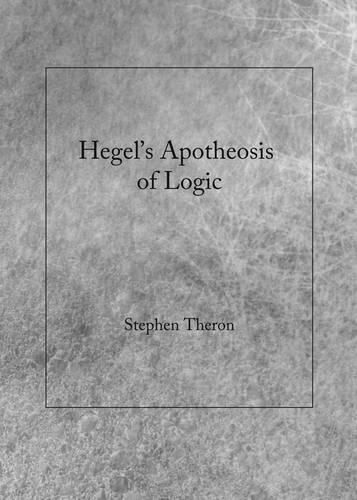Readings Newsletter
Become a Readings Member to make your shopping experience even easier.
Sign in or sign up for free!
You’re not far away from qualifying for FREE standard shipping within Australia
You’ve qualified for FREE standard shipping within Australia
The cart is loading…






This book presents what Hegel calls the vital spirit of the actual world , the truth, namely, of logic’s form and content as one concrete whole. Axiomatic here is that thinking is necessarily free and unbounded, if we could escape a performative contradiction in evaluating it. Thinking is absolute, what Hegel calls spirit or mind, Geist. He identifies three forms of absolute spirit , namely art, religion and philosophy, where each form is absorbed into the next one; philosophy subsumes religion and religion subsumes art, in a process seeking and achieving the absolute. Philosophy, therefore, is ultimately theology as fulfilling the latter in mind’s constitutive self-transcendence towards the absolute idea , itself the absolute, Hegel asserts. This is absolute idealism , where the Idea is true being and finite things are transitory notions. This book aims to clarify such conceptions, whereby theological transcendent grace is natural or all in all , faith is absolute knowledge in germ, things are the opposite of what they immediately seem, while achieved self-consciousness is the ruin of the individual abstractly parted from its objects. Thus external nature is internal, the whole in or one with the part, necessity absolute freedom, these being stages of Logic.Hegel needs a second, related trio to the above three forms. This is logic, nature and mind, likewise, in ceaseless process, a returning upon self. Thus art’s foundational quality mirrors that of the logical art . The individual art-object, art as striving for absolute perfection, founds spirit’s trajectory. Hence, consciousness first appears individual only as set towards universal self-consciousness in absolute knowing .
$9.00 standard shipping within Australia
FREE standard shipping within Australia for orders over $100.00
Express & International shipping calculated at checkout
This book presents what Hegel calls the vital spirit of the actual world , the truth, namely, of logic’s form and content as one concrete whole. Axiomatic here is that thinking is necessarily free and unbounded, if we could escape a performative contradiction in evaluating it. Thinking is absolute, what Hegel calls spirit or mind, Geist. He identifies three forms of absolute spirit , namely art, religion and philosophy, where each form is absorbed into the next one; philosophy subsumes religion and religion subsumes art, in a process seeking and achieving the absolute. Philosophy, therefore, is ultimately theology as fulfilling the latter in mind’s constitutive self-transcendence towards the absolute idea , itself the absolute, Hegel asserts. This is absolute idealism , where the Idea is true being and finite things are transitory notions. This book aims to clarify such conceptions, whereby theological transcendent grace is natural or all in all , faith is absolute knowledge in germ, things are the opposite of what they immediately seem, while achieved self-consciousness is the ruin of the individual abstractly parted from its objects. Thus external nature is internal, the whole in or one with the part, necessity absolute freedom, these being stages of Logic.Hegel needs a second, related trio to the above three forms. This is logic, nature and mind, likewise, in ceaseless process, a returning upon self. Thus art’s foundational quality mirrors that of the logical art . The individual art-object, art as striving for absolute perfection, founds spirit’s trajectory. Hence, consciousness first appears individual only as set towards universal self-consciousness in absolute knowing .